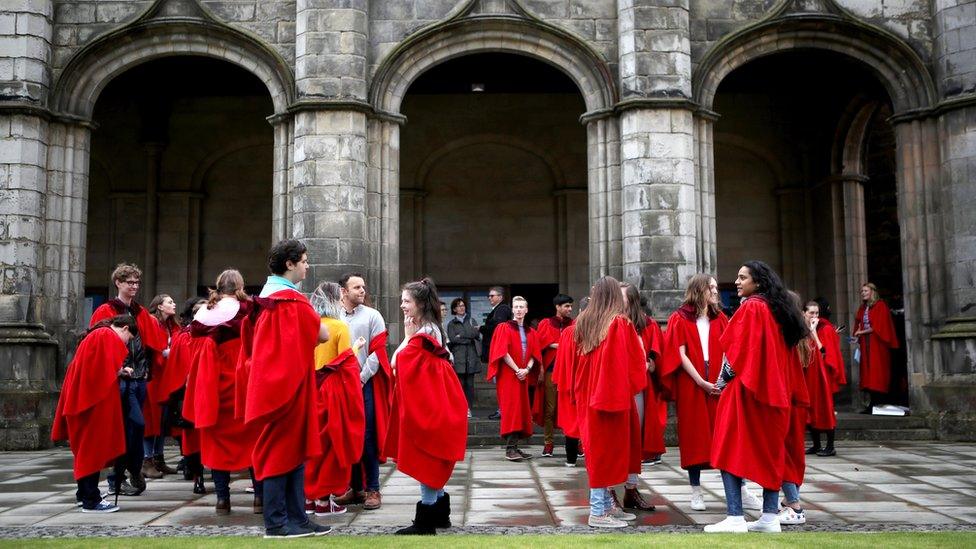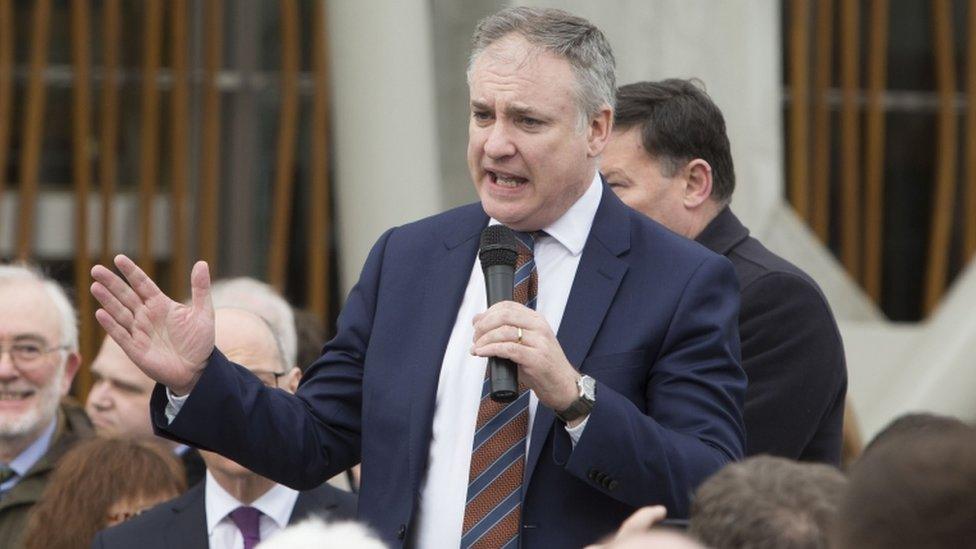Row over cap on English students at Scottish universities
- Published

Universities such as St Andrews could be prevented from taking in an increased number of English students
Scottish university bosses have hit out after UK ministers capped the number of English students they can enrol.
The UK government is to impose "student number controls" to prevent "over-recruitment" by some institutions.
These controls will also apply to universities in Scotland, meaning they will not be able to increase the intake of English students by more than 6.5%.
Scottish Higher Education Minister Richard Lochhead said the move was "deeply disappointing and unnecessary".
And Universities Scotland said it was "wholly unfair on students and student choice" and "disproportionately disadvantages Scotland".
English, Welsh and Northern Irish students have to pay tuition fees north of the border, while the Scottish government funds places for students from Scotland and the rest of the EU - for now.
In 2018-19 there were 5,245 full-time first degree entrants to Scotland's universities from England. Applications for courses starting in 2020 were up 3% year-on-year prior to the pandemic, although it is thought the crisis may prompt many students to change their plans.
With universities facing an uncertain future due to the coronavirus pandemic, there are fears that some could make mass unconditional offers to applicants to ward off a potential funding shortfall.

Richard Lochhead said the cap was being imposed on Scotland without agreement
This has prompted the UK Department for Education to introduce a temporary cap on the number of English-based students that can be admitted to universities in 2020-21 - limiting each to an increase of about 6.5% on the previous year.
The cap will be enforced by the UK government which said it would cut the funding available to universities that breach the limit.
It has now been confirmed, external that the cap will apply to English students applying to universities in Scotland, Wales and Northern Ireland, as well as those in England.
UK Universities Minister Michelle Donelan said the controls would "stabilise the admissions system" and "avoid harmful over-recruitment among providers which could go against the interests of students and the sector".

Universities Scotland said because the overall numbers of English students were much lower at Scottish institutions, it would only require a smaller number of new entrants to result in them falling foul of the cap.
The group said it would only take an extra 23 English students to see Dundee University breach the limit, and an additional 42 at St Andrews compared to the previous year. This is in contrast to an extra 327 at Manchester University or 439 at Leeds.
Director Alastair Sim said having the cap apply north of the border was a "late and low blow".
He said: "Number controls were a specific solution to address a specific admissions problem in England, that Scotland's universities had no part in.
"The devolved administrations should be removed from this intended legislative change - it is not the role of the UK government to determine student numbers in Scotland."


For Scottish universities there is a principle here - they do not feel the Westminster government should tell them at this stage how many English students to admit.
Higher education in Scotland is a devolved matter - normally Scottish universities can decide for themselves how many fee-paying students from the rest of the UK to give places to.
Universities expect a big drop in the number of students from countries outside Europe who pay uncapped fees of about £30,000 a year. But an increase in the number of students from the rest of the UK, whose fees are a fraction of this, would not have made up for this loss of revenue.
They believe there was never any chance of a dramatic - or some night say opportunistic - rise in the number of students from other parts of the UK in Scotland to begin with.
It remains to be seen however what practical effect the limit may actually have. Universities have already made their conditional and unconditional offers.
Assuming the numbers are broadly similar to previous years, it would seem unlikely that anyone who has been made an unconditional offer or who meets a conditional offer will actually be denied a place.
A university which now denied a place to an applicant who met the requirements of their offer could be open to a legal challenge.

Mr Lochhead, who spoke with Ms Donelan about the issue on Monday, said the move was "deeply disappointing" and "completely unnecessary".
He said: "The UK government should be working with the devolved administrations to support higher education at a time of crisis not imposing - without agreement, targets and sanctions which are aimed at stabilising the English market and are not relevant to Scotland."
The move has also caused anger in the other devolved administrations, with Welsh Education Minister Kirsty Williams saying she was "deeply concerned" about the UK government's "surprising unwillingness to respect complementary policies in each nation".
And Stormont's Economy Minister Diane Dodds said, external she was "wholly opposed" to the plan, saying she was "shocked and concerned that another jurisdiction is seeking to control student numbers here in Northern Ireland".
She added: "I believe that this proposal has the potential to break up the unified higher education market within the United Kingdom in terms of access to study based on student choice and academic achievement. It is a dangerous precedent to set and one I am wholly opposed to."